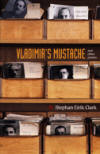Vladimir’s Mustache and Other Stories
In 1953, Isaac Berlin composed what is perhaps his best known essay, “The Fox and The Hedgehog,” in which he outlines two specific types of literary genius. He describes Russian writers like Fyodor Dostoyesky who focus narrowly on a character—exploring the every nuance and complex mystique of an individual within his broader context. Authors like Alexander Pushkin, on the other hand, utilize a broad long duree approach to narrative, giving the reader such a sweeping perspective that the individual is simply one part among many of the fabric or context that surrounds him. In short, Berlin’s “foxes” and “hedgehogs” are a useful structure for making sense of two different traditions of literature—particularly Russian literature—along a continuum, and Berlin’s allegorical mammals become a shorthand reference to a specific perspective or type of narration. Vladimir’s Mustache and Other Stories by Stephan Eirik Clark is a brilliant collection of short stories that illustrate the genius of both fox and hedgehog types in Russian literature. Each of his short stories is a fox or a hedgehog with a unique or ironic plot twist that brings to light Clark’s dark absurdist humor.
In 1953, Isaac Berlin composed what is perhaps his best known essay, “The Fox and The Hedgehog,” in which he outlines two specific types of literary genius. He describes Russian writers like Fyodor Dostoyesky who focus narrowly on a character—exploring the every nuance and complex mystique of an individual within his broader context. Authors like Alexander Pushkin, on the other hand, utilize a broad long duree approach to narrative, giving the reader such a sweeping perspective that the individual is simply one part among many of the fabric or context that surrounds him. In short, Berlin’s “foxes” and “hedgehogs” are a useful structure for making sense of two different traditions of literature—particularly Russian literature—along a continuum, and Berlin’s allegorical mammals become a shorthand reference to a specific perspective or type of narration. Vladimir’s Mustache and Other Stories by Stephan Eirik Clark is a brilliant collection of short stories that illustrate the genius of both fox and hedgehog types in Russian literature. Each of his short stories is a fox or a hedgehog with a unique or ironic plot twist that brings to light Clark’s dark absurdist humor.
Through all nine of his short stories, Clark’s narrators explore the question of Russian identity from the time of Peter the Great to the years of the post-Soviet collapse. Perhaps the most unique aspect of Clark’s writing is his ability to manipulate and repurpose the role of the narrator. The narrators in Clark’s short stories—whether they are literature professors exploring the world of mail-order Ukrainian wives, an Italian castrato whose life-long dream is to sing for the tsar, or Kamkov the astronomer who is constantly “re-educated” in camps—all manage to eke out some sort of claimed existence through their dark humor. They are characters who can and are read in complete sympathy by the audience—even the Stalin-era method actor who learns the hard way the danger of losing his own, claimed identity after he has been cast as the role of Hitler for a play, owing to his stature and his moustache. These narrators are fundamentally sympathetic because there is a certain dark sympathetic humor about them that lets them uniquely identify with their Russian history.
Two of the short stories stand out within Clark’s collection of foxes and hedgehogs. In the first, “Kamkov the Astronomer,” two astronomers are trying to decide whether a particular constellation is Cassiopeia or Orion. In Stalin’s presence, their argument runs the gambit of astronomy, philosophy, and logic and eventually descends into a bout of fisticuffs as they cannot come to an agreement about evidence, argument, and how any and all of this might be evaluated for Stalin. The ironic bend in the story, however, begins to develop as the reader is told that all of the knowledgeable astronomers have been put into camps and there is no intellectual community left to be able to check the claims that the two astronomers have made. Eventually, Kamkov the Astronomer is called from a prison camp to determine the argument, but his knowledge brings no reprieve toward his broader fate as Stalin has already signed an execution order for him without making any connection between Kamkov the Astronomer whose expertise he sought and Kamkov the Astronomer whom he ordered executed.
A similar sense of fated irony is seen in “The Castrato of St. Petersburg,” where the dream of a young castrato, Petrus, is to become a famous singer and perform for the tsar. After overcoming many obstacles, when the castrato finally has an audience with the tsar, the reader is convinced that Petrus’s dreams are to be realized completely. However, Clark’s fantastic bit of narrative twist comes in in the last section of the short story where Petrus, who in reality had very little musical talent, is put into the tsar’s “cabinet of curiosities” as a living specimen for victors to see and to hear sing. Petrus is indeed immortalized by the tsar and is more than resigned to it—he embraces his immortalized self.
Vladimir’s Mustache and Other Stories is a brilliant collection of short stories—full of complexly simple characters with enough twists and turns in every plot to keep the reader hooked in Clark’s historical imaginings. This collection shows both the foxes and the hedgehogs of Russian literature, and Clark proves to be a master of both.





